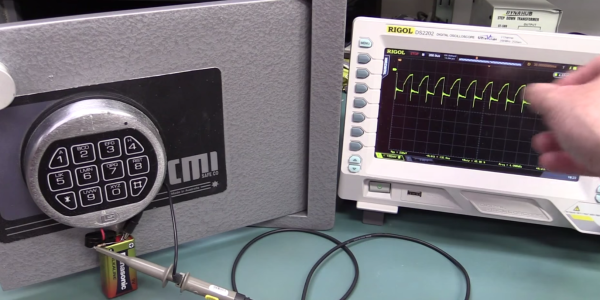[Dave Jones] over at EEVblog got his hands on a small safe with an electronic lock and decided to try his hand at safe cracking. But rather than breaking out the thermal drill or shaped charge, he hooked up his Rigol scope and attempted a safe cracking via signal analysis (YouTube link).
We have to say that safes Down Under seem much stouter than most of the inexpensive lock boxes we’ve seen in the US, at least in terms of the quality (and quantity) of the steel in the body of the safe. Even though [Dave] was looking for a way in through the electronics, he still needed to deal with all that steel to get himself out of a face-palm moment that resulted in a lockout. Once that was out of the way, he proceeded to capture usable signals from the internal microcontroller using the only two available contacts – the 9 volt battery connections. While he did get signals, he couldn’t find any signatures that would help determine the six digits in the PIN, and as he points out, even if he did, brute-forcing through the one million permutations to find the right code would take too long, given the wrong-code lockout feature of the lock.
Even though he failed to hack into this particular safe, there’s still plenty to be learned from his methods. And who’s to say that other similar locks aren’t a little more chatty about their internals? Maybe you could even manage to EMP your way past the lock.











